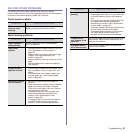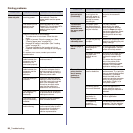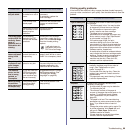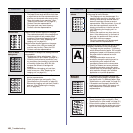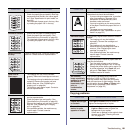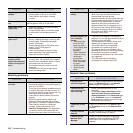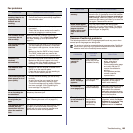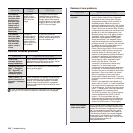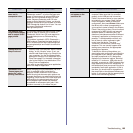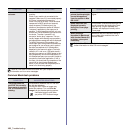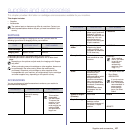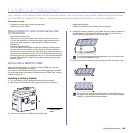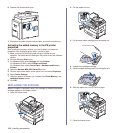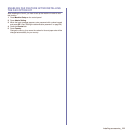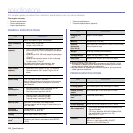
Troubleshooting_ 105
Some color images
come out in
unexpected color.
This is a known bug in Ghostscript (until GNU
Ghostscript version 7.xx) when the base color
space of the document is indexed RGB color
space and it is converted through CIE color
space. Because Postscript uses CIE color
space for Color Matching System, you should
upgrade Ghostscript on your system to at least
GNU Ghostscript version 8.xx or later. You can
find recent Ghostscript versions at
www.ghostscript.com.
The machine does
not print whole pages
and its output is half
page printed.
It is a known problem that occurs when a color
printer is used on version 8.51 or earlier of
Ghostscript, 64-bit Linux OS, and reported to
bugs.ghostscript.com as Ghostscript Bug
688252.
The problem is solved in AFPL Ghostscript v.
8.52 or above. Download the latest version of
AFPL Ghostscript from http://sourceforge.net/
projects/ghostscript/ and install it to solve this
problem.
I cannot scan via
Gimp Front-end.
• Check if Gimp Front-end has “Xsane: Device
dialog.” on the “Acquire” menu. If not, you
should install Xsane plug-in for Gimp on the
your computer. You can find Xsane plug-in
package for Gimp on Linux distribution CD or
Gimp home page. For the detail information,
refer to the Help for Linux distribution CD or
Gimp Front-end application.
If you wish to use other kind of scan application,
refer to the Help for application.
I encounter error
“Cannot open port
device file” when
printing a document.
Avoid changing print job parameters (via LPR
GUI, for example) while a print job is in
progress. Known versions of CUPS server
break the print job whenever print options are
changed and then try to restart the job from the
beginning. Since Unified Linux Driver locks port
while printing, the abrupt termination of the
driver keeps the port locked and therefore
unavailable for subsequent print jobs. If this
situation occurred, try to release the port.
CONDITION SUGGESTED SOLUTIONS
The machine does
not appear on the
scanners list.
• Check if your machine is attached to your
computer. Make sure th
at it is connected
properly via the USB port and is turned on.
• Check if the scanner driver for your machine
is installed in your system. Open Unified
Driver configurator, switch to Scanners
configuration, then press Drivers. Make sure
that driver with a name corresponding to
your machine's name is listed in the window.
Check if the port is not busy. Since functional
components of MFP (printer and scanner)
share the same I/O interface (port), the
situation of simultaneous access of different
“consumer” application to the same port is
possible. To avoid possible conflicts, only
one of them at a time is allowed to gain
control over the device. The other
“consumer” will encounter “device busy”
response. This can usually happen while
starting scan procedure, and appropriate
message box appears.
•
To identify the source of the problem, you
should open ports configuration and select the
port assigned to your scanner. port's symbol /
dev/mfp0 corresponds to LP:0 designation
displayed in the scanners’ options, /dev/mfp1
relates to LP:1 and so on. USB ports start at /
dev/mfp4, so scanner on USB:0 relates to /dev/
mfp4 respectively and so forth sequentially. In
the Selected port pane you can see if the port is
occupied by some other appli
cation. If this is
the case, you should wait for completion of
the current job or should press Release port
button, if you are sure that the present port's
owner is not functioning properly.
CONDITION SUGGESTED SOLUTIONS



